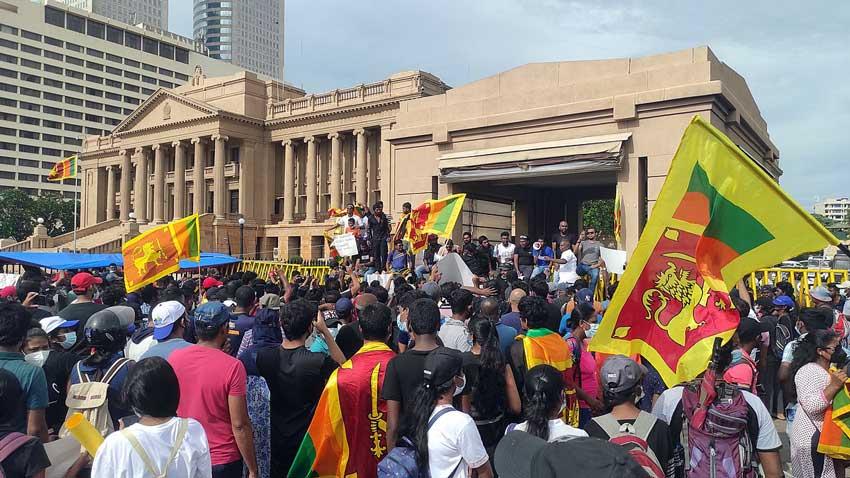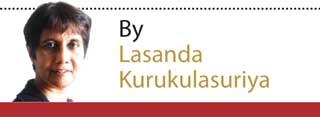05 May 2022 - {{hitsCtrl.values.hits}}

Protesters who are apolitic, gathered opposite the presidential secretariat at the Galle Face Green carrying on their protests for over three weeks demanding the corrupt regime should quit
 The extraordinary protests taking place around the country today are unlike anything this country has seen before. Its participants come from all walks of life, cutting across lines of race and class, not representing any political party or group. Demonstrations that started in response to an acute economic crisis, have evolved into a mass protest calling for a complete system change, a rejection of ruling political elites, whom protesters blame for beggaring the country at the people’s expense. They insist that the president must step down, along with his relatives holding high office. ‘Gota go Home!’ is the rallying cry. Has President Gotabaya Rajapaksa finally, unintentionally, united the country – in a movement that has come together to dislodge him?
The extraordinary protests taking place around the country today are unlike anything this country has seen before. Its participants come from all walks of life, cutting across lines of race and class, not representing any political party or group. Demonstrations that started in response to an acute economic crisis, have evolved into a mass protest calling for a complete system change, a rejection of ruling political elites, whom protesters blame for beggaring the country at the people’s expense. They insist that the president must step down, along with his relatives holding high office. ‘Gota go Home!’ is the rallying cry. Has President Gotabaya Rajapaksa finally, unintentionally, united the country – in a movement that has come together to dislodge him?
Ironically, protests include the constituencies that voted this government into power – among the 6.9 million comprising youth, working class, professionals, intellectuals, artistis, daily-wage labourers, business people, farming and fisher communities among others. They reflect an erosion of the government’s main support base among the Sinhala Buddhist majority. Prominent members of the Buddhist clergy who helped bring the government to power, are now accusing it of betraying people’s trust, and support the protesters. People’s anger has grown, not only over increasing economic hardships, but a pervasive sense that graft and corruption continue, with the crisis itself being exploited for profit by those in power, and their cronies.
The government’s counter moves to shore up support have seen some scattered pro-Gotabaya protests emerge. The uniformity of the placards, of the same colour with neatly printed slogans, suggest that these events were politically choreographed. Some participants sought to discredit the mass agitation going on elsewhere as an activity of “whiskey-drinking Colombo kids” etc. These actors forget that the anti-government protest wave started with farmers demanding chemical fertilizer, after the fertilizer subsidy was withdrawn. Though the president’s move to ban chemical fertilizer imports had a worthy objective of introducing organic farming, the ill-planned, rushed scheme failed. Resulting Maha season crop failure aggravated the plight of debt-ridden farmers.
It was against this backdrop that the Prime Minister announced, during an ‘address to the nation,’ that the fertilizer subsidy would be restored. The government having been deaf to farmers’ lamentations for months on end, this sudden change of heart raises the question as to whether it was actually a tactical move, aimed at removing an important rural constituency from the protest, thereby weakening it?
Dissident group
The PM’s speech was broadcast the same day that the president appointed SLFP MP Shantha Bandara as State Minister for the promotion of organic farming. It was not without purpose that Sasheendra Rajapaksa sacrificed his post to create the vacancy. Bandara belonged to the group of 41 ‘independent’ MPs which includes 14 SLFP MPs who quit the ruling SLPP coalition, 10 other smaller coalition partners and some disillusioned SLPP lawmakers. This block will be decisive in tilting the balance in parliament, in a situation where the president has challenged the opposition to prove it has a majority. Bandara’s exit represents the first crack to appear in the dissident group. This parliament has seen opposition MPs up for auction many a time before, at critical moments.
Galle Face Green and the barricaded presidential secretariat nearby have become the focal point where thousands from far and wide have been gathering, for over three weeks now. Artistes, film personalities, cricketers and other public figures have been visiting, to shower their blessings on the young protesters. Many who spoke to TV reporters expressed disgust with politicians who have throughout history exploited race, caste and religion to create divisions in society in order to stay in power. In days ahead, the danger that the peaceful, youth-led Galle Face protest may be infiltrated by saboteurs is very real.
SLFP General Secretary MP Dayasiri Jayasekara told reporters at a televised news briefing, “People may protest in the street, but the problem has to be resolved by the president and parliament.” He added that “People’s demand is for a government and cabinet without Gota, if that is not done the protests will certainly continue.” And protests do continue to be reported from around the country, by angry citizens fed up of standing in queues, demanding basic necessities of fuel, cooking gas, foodstuffs and medicines.
Constitutional provisions
There are constitutional provisions for an incumbent president to step down. Foreign Minister
G. L. Peiris, briefing Colombo-based diplomats said they included “the prime minister taking over for 60 days ... after which the MPs would have to elect a suitable leader among them to lead the country for the remaining period until an election can be held.” Government’s extreme reaction after a clash on March 31 outside the president’s house in Mirihana where a peaceful protest turned violent, points to a failure on the part of rulers to understand public sentiment, and the changing political climate. Emergency rule was declared, a 36-hour island-wide curfew imposed and social media blocked (all later withdrawn). At numerous locations on Sunday (3) protests continued with total disregard to the curfew.
Cabinet ministers handed in resignation letters to the Prime Minister, a few days after a clash. However, there are no signs that the move will lead to any real change. The president’s invitation to all political parties in parliament to ‘accept ministerial portfolios in order to find solutions to this national crisis’ was rejected by the opposition. The main opposition Samagi Jana Balavegaya’s leader Sajith Premadasa calls for abolition of the executive presidency, and there is talk of abolishing the 20th amendment that vested more powers in the presidency.
The abolition of the 20A resonates with the “Gotogohome” slogan of protesters. It was the 20A that dropped a clause prohibiting dual citizens from holding high office, thus paving the way for Basil, who holds both Sri Lankan and US citizenship, to enter parliament. Protesters’ slogans reflect mistrust of the US links of former finance minister Basil and his brother, the president, whose son lives in the USA (“Son, call your father home” read one placard). Many protesters’ comments were aired on TV, express the feeling that the Rajapaksas have ‘other homes’ and ‘enough money,’ so they should ‘go home’ and let those who are more capable run the country. Some go further, demanding that ‘stolen money must be returned’ and that Rajapaksas be sent to jail. It’s clear that whatever political capital, the once-popular, war-winning former president Mahinda had accumulated, has been squandered by his brothers.
For the first time, Sri Lanka is on the verge of a sovereign debt default. A new Central Bank governor has announced there will be a ‘temporary suspension of foreign debt payments,’ so that limited foreign exchange could be used to buy essentials. Negotiations for an IMF bailout are being discussed. It is a moment of great uncertainty for the country - yet the unstoppable wave of energy on the street signals hope as well.
27 Nov 2024 24 minute ago
27 Nov 2024 54 minute ago
27 Nov 2024 1 hours ago
27 Nov 2024 2 hours ago
27 Nov 2024 3 hours ago